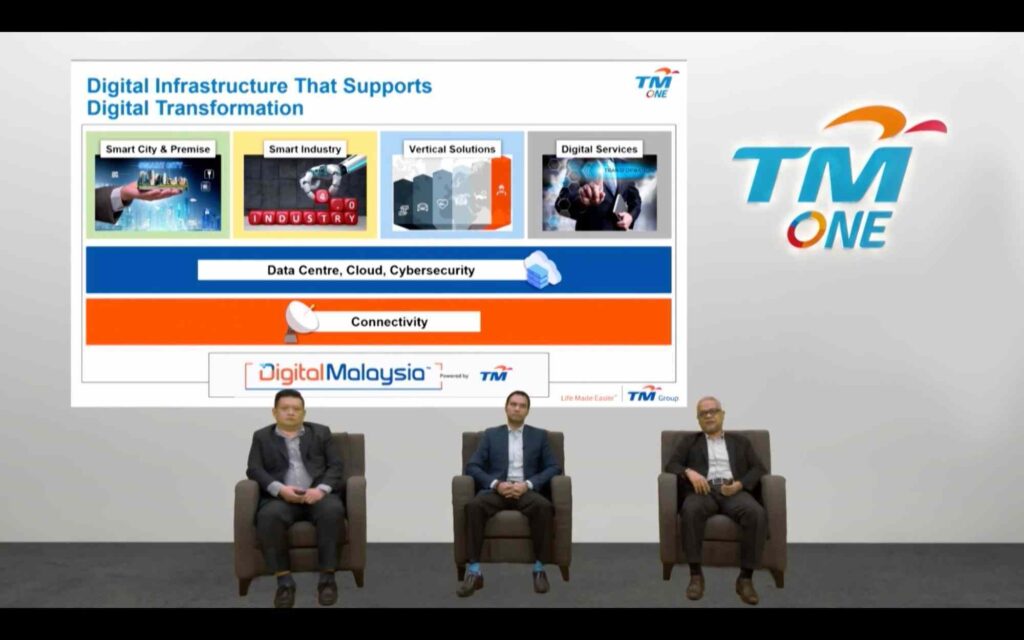
Frontier technologies such as AI, machine learning together with more responsive, pervasive cloud platforms, which have triggered mounting disruption of multiple industries and much of our daily life, will continue to accelerate in 2021.
With an eye on the manufacturing sector, a recent online industry debate — the Smart Manufacturing Circuit (SMC) held mid-December 2020 — conducted a reality check of technology-induced benefits and values.
Moderated by Maznan Deraman, head of Innovation Solutions at TM One, the enterprise solutions arm of Telekom Malaysia, the leadership panel comprised Eng Chew Hian, Business Development director of Huawei Cloud, and Sudev Bangah, managing director of IDC ASEAN.
Given the rapidly shifting global economic ecosystem, manufacturers are earnestly looking for the right matrix of technologies, people and process changes that will enhance competitiveness and get ahead of the pack, agreed the speakers.
To extrapolate best practices from current industry case studies, the panel distilled several short to long term strategic priorities. The discussion included a deep dive into the challenges faced by the manufacturing business, which largely reflect the overall industry scenario, i.e. keeping abreast of the competition in a fragile and fast-changing environment.
According to IDC's Asia Pacific Insights Annual Survey 2019, 78% of the region's manufacturing businesses saw declining sales, while 74% reported demand variability, and 37% pointed to increased competition, and lack of innovation (27.8%), as well as rising internal costs (20.4%).
In addition, 24% of manufacturing costs were attributed to downtime, 90% of maintenance work was categorised as 'crisis work' to fix breakdowns, and the amount by which total downtime cost was usually underestimated by 300%
Addressing these business challenges demands transformative strategies to deliver results, declared all three panellists. These include improved supply chain performance, enhanced operational excellence and operational risks, stronger focus on product innovation and tapping new markets and customer segmentations.
However, the road that must be travelled has to be built on digital frameworks, the panel continued. On 1st January 2021, Malaysia's government said its 12th Malaysia Plan (12MP) will increase focus on new economic drivers such as the digital economy in tandem with the green economy. In line with this, a national digital policy is expected in Q1 of 2021.
Sudev Bangah cited IDC's studies of organisational recovery, which highlighted an increased prioritisation of business resiliency. "Organisations need to look forward, and it is important for strategic priorities. Moving towards targeted investments — AI, IoT, robotics, cloud, machine learning — are typical areas for investment."
IDC's APAC studies confirmed that when building a digital transformation use case, clarifying strategic priorities will better build resiliency, and enhance yield from digital implementations, Sudev explained.

Speaking of four value chains of manufacturing, he said: “Across the board, manufacturers are looking towards technology adoption to drive strategic priorities: engineering oriented; technology oriented; asset oriented and brand oriented.”
A major component of digitalisation is cloud computing, Huawei's Eng pointed out. Earlier in 2020, TM One announced an agreement with Huawei as another step in its aim to aggregate partners and solutions to become the country’s first locally owned end-to-end comprehensive cloud AI infrastructure provider.
He outlined several cross-industry use cases which included Alpha Edge implementations such as one that uses drone and AI image processing applications to perform aircraft surface inspections “(This solution’s) emphasis on security, trust, speed and robust scalability,
TM One’s Maznan said, “Some of the benefits that cloud delivers to companies include bringing products to market faster; enhancing performance and productivity more efficiently; heightening competitiveness; simplifying and speeding up modernisation plans; as well as more effective collaboration with ecosystem partners.”
“Using digital solutions to achieve enhanced, connected production, real-time manufacturing and predictive analytics is part of the process of the transformation of the ecosystem, which includes people and existing processes.”
As an example, Maznan detailed the company’s Overall Equipment Effectiveness (OEE) — a tool for manufacturers to tackle efficiency and productivity gaps without human intervention. “OEE helps to reduce common causes of equipment failure, maximise workforce effectiveness, and gives the capacity to visualise overall performance more easily.”
Tackling the bigger picture, the panel agreed that, to varying degrees, pandemic-related lockdowns procedures have indeed accelerated digital disruption. “People and businesses have had little choice: to take control of their transformation or bow out of the arena.”
Government initiatives to encourage smart manufacturing include the international trade and industry ministry’s (MITI’s) Industry4wrd policy. This framework includes three core elements and eight core thrusts designed to create a pathway for enhanced productivity, job creation, and growing a high-skilled talent pool in the manufacturing sector.
Atillea Razali from SME Bank Malaysia presented another example, in a separate session, on technology grants such as SME Technology Transformation Fund (STTF), which offers financing up to RM3 million to help in various transformation projects.
In the concluding sequence, the panel emphasised that, "Understanding and optimising operations is interlinked with the use of data and analytics."
Bangah commented: “The acceleration of digital transformation is causing a rethink among manufacturers. This may call for a tweak to the 2021 playbook for many manufacturers: as an example, digitalising your supply chain will be one of the most critical areas.”
Bangah concluded by citing one of IDC's key takeaways for 2021: “Technology is one complementing element, to enable your business to reach a new level on your journey. It is critical to find a partner on this journey who can offer all the support to enable a smoother journey."
Maznan's concluding summary included TM One Alpha Edge offerings to manufacturers to smooth the transition to smart manufacturing In tandem with the uphill recovery this year. “This is coupled with an ongoing partnership, as well as industry-specific solutions that offer a more holistic collaborative path to manage the transformation effectively.”
This article was first published on Disruptive.Asia (https://disruptive.asia/2021-smoothing-transition-smart-manufacturing-malaysia/)
